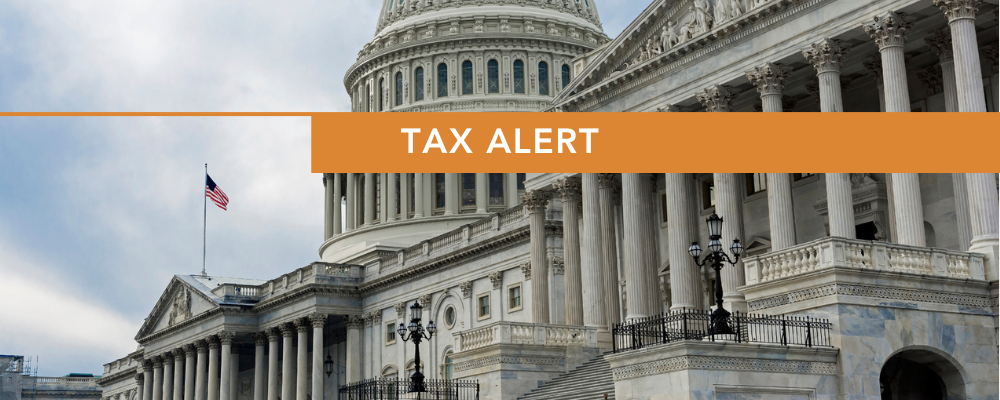What you’ll learn in this article:
- A side-by-side comparison of prominent tax provisions in the House and Senate versions of the One Big Beautiful Bill alongside the final law, which was enacted on July 4, 2025.
- Effective dates and impacts of changing tax provisions in the One Big Beautiful Bill.
- Insight and analysis on bonus depreciation, Qualified Business Income (QBI) deduction for pass-through entities, deductions on tip and overtime pay for workers, and more.
The recently passed One Big Beautiful Bill Act (OBBBA) makes sweeping changes to the tax code, with certain industries feeling the effects more than others, especially capital-heavy and labor-intensive businesses in construction & real estate, hospitality, and manufacturing. Businesses structured as pass-through entities, regardless of industry, and taxpayers living in high-tax states are likely to experience less tax liability. For some taxpayers, the loss of other tax provisions, namely those in clean energy, should be considered as part of a larger tax strategy.
Building on provisions from the 2017 Tax Cuts and Jobs Act (TCJA), the new legislation seeks to simplify expensing, increase the value of deductions, and reward domestic investment. While both House and Senate versions shared goals of permanence and expansion, they differed on clean energy credits, income exclusions, and caps. The final version favors capital-heavy and labor-intensive industries, like construction & real estate, hospitality, and manufacturing, as well as high net worth taxpayer by giving them more options for estate planning and generational wealth transfer. The other big change businesses need to be aware of is the new first-year 100% bonus depreciation for qualified production property (QPP). This is especially relevant to manufacturers and any business involved in producing or refining tangible personal property, like vehicles, furniture, electronics, jewelry, clothing, and office machinery.
Employers that have claimed the Work Opportunity Tax Credit (WOTC) in the past may be disappointed to learn that this provision was not extended in the recent legislation. Absent additional Congressional action, WOTC is set to expire at the end of 2025.
Business Tax Changes
| Provision | House Version | Senate Version | Final Law | Effective Date | Impact |
|---|---|---|---|---|---|
| Bonus Depreciation | Extend 100% bonus depreciation through 2029 | Make permanent | Permanent 100% expensing for qualified assets placed in service | Eligible equipment purchased after January 20, 2025 | Key benefit to construction & manufacturing firms purchasing large equipment. Cost segregation studies could become more popular. |
| Bonus Depreciation – QPP | 100% depreciation for QPP placed in service after January 19, 2025; phase-outs beginning in 2030 | Make permanent | First-year, 100% depreciation for nonresidential real property placed in service before the end of 2030 |
|
Reduced taxable income the year assets are placed in service; advantageous for cash flow planning and reinvesting in the business |
| Charitable Contributions – Corporate | Implements a minimum contribution amount of 1% in taxable income before tax deduction takes effect | Same | Eligible contributions between 1-10% of corporate taxable income | January 1, 2026 | Mixed outlook depending on business size; charitable contributions as part of tax planning to remain a priority |
| Clean Energy Credits | Repeal Inflation Reduction Act (IRA) clean-energy credits, immediate phase-out | Gradual phase-out for certain sectors (solar, wind, electric vehicle (EV) credits) | Phased repeal by 2026 | Phased out by December 31, 2026. EV Credits phased out by September 30, 2025 | Negatively affects real estate developers using energy efficient incentives |
| Interest Deductibility | Return to EBITDA-based limit | Same | EBITDA-based limitation restored | January 1, 2025 | Positive for leveraged real estate and construction projects |
| Low-Income Housing Tax Credit (LIHTC) | Increase annual state credit allocations; lower thresholds | Similar but lower increases | Expanded LIHTC, modest boost to allocations | January 1, 2025 | Encourages affordable housing development, favorable for real estate |
| QBI Deduction (199A) | Make pass-through deduction permanent and increase deduction to 23% | Make pass-through deduction permanent and maintain deduction at 20% | Permanent pass-through deduction and maintain deduction at 20% of qualified business income | January 1, 2025 | Major win for pass-through entities as this provision is a very valuable tax deduction for many taxpayers |
| R&D Expensing | Immediate and permanent full expensing for domestic R&D | Same | Permanent full expensing | January 1, 2025 | Benefits manufacturing, construction, and other industries investing in innovation |
| Section 179 Expensing | Raise expensing limit to $2.5M; increase phase-out threshold | Similar | Expanded expensing limits permanently | January 1, 2025 | Immediate benefit for small-to-mid size businesses and one of the most popular business tax provisions |
| Small Business Stock (QSBS) | Expand capital gain exclusion for qualified investments | Similar | Expanded gain exclusion and higher thresholds | January 1, 2025 | Encourages VC/PE investment in small businesses |
Individual Tax Changes
| Provision | House Version | Senate Version | Final Law | Effective Date | Impact |
|---|---|---|---|---|---|
| Charitable Contributions | $150 (single) or $300 (joint) deduction for contributions; expiration at the end of 2028 | Make permanent; introduction of a 0.5% minimum contribution amount for itemizers | Non-itemized returns: $1,000 (single)/$2,000 deduction
Itemized returns: 0.5% floor of adjusted gross income (AGI) before contributions can be itemized Contributions to donor-advised funds are ineligible Deduction limits for high earners |
January 1, 2026 | More consistent planning for charitable contributions and potentially more limitations for high earners; mixed outlook for charitable organizations and foundations |
| Child Tax Credit | Increase to ~$2,700 per child; refundable; indexed for inflation | Slightly lower amount; refundable | Increased credit of $2,200, expanded through 2028 | January 1, 2025 | Increases disposable income for taxpayers with families |
| Gambling Loss Deduction | N/A | Deduct up to 90% of losses (instead of the current 100%) | Tax deduction for gambling losses capped at 90% | January 1, 2026 | Lower tax benefit for bettors, especially high-volume gamblers |
| Overtime & Tip Income Deduction | Excludes overtime and tips from taxable income up to $12,500 (single) or $25,000 (joint) | Same – temporary deductions for both tips and overtime pay from 2025-2028 | Above the line deduction for tips and overtime pay with income phase outs starting at $150K (single) or $300K (joint) in modified adjusted gross income (MAGI) | January 1, 2025 | Strong win for hourly laborers in industries like construction, manufacturing, and hospitality |
| SALT Cap | Raise cap from $10K to $40K through 2029 | Keep $10K cap | $40K SALT cap, temporary | January 1, 2025 – December 31, 2029 | Huge benefit to taxpayers in high-tax states |
| Standard Deduction | Permanently increase standard deduction | Same | Increased permanently | 1-Jan-25 | More take-home pay for middle-class workers |
| Trump Accounts (Minor Savings) | Tax-advantaged accounts for children; flexible use cases | Same | New savings vehicle for minors | 1-Jan-25 | Encourages generational wealth planning for taxpayers |
| 1031 Like-Kind Exchange | No direct proposal | Suggested minor restrictions | Remains unchanged | N/A (unchanged) | Real estate investors retain key deferral mechanism for property exchanges |
Estate and Gift Tax Planning
| Provision | House Version | Senate Version | Final Law | Effective Date | Impact |
|---|---|---|---|---|---|
| Estate & Gift Tax Exemption | Raise estate, gift, and GST exemption to $15 million per individual (indexed); permanent | Similar increase to $15 million; favored indexing and permanency | Exemption increased to $15 million per individual (indexed for inflation); permanent | January 1, 2026 | Significantly expands tax-free wealth transfer capacity; reduces estate tax exposure for families with business, real estate, or investment holdings; key benefit for multigenerational planning |
The final version of OBBBA delivers sweeping reforms aimed at rewarding physical investment, family support, and pass-through business activity. Permanent bonus depreciation, expanded Section 179 expensing, and a stabilized QBI deduction provide significant tax certainty and liquidity for construction and real estate firms and developers, hospitality businesses, manufacturers, and other pass-through entities. Meanwhile, increased child credits and income exclusions for overtime and tips support working class households—the backbone of these industries. However, the repeal of clean energy incentives may deter green building projects and energy efficient upgrades, long seen as innovations in construction and real estate.
At the same time, the Taxpayer Advocate Service (TAS) has raised concerns about the IRS’s ability to implement these extensive tax changes. According to its 2025 midyear report to Congress, the IRS workforce declined by 26% from January to June, with especially sharp cuts to taxpayer services and IT personnel. TAS warns that the combination of reduced staffing and the operational complexity of the OBBBA could significantly impair the IRS’s ability to process returns, issue guidance, and respond to taxpayer inquiries in the 2026 filing season. Without reinvestment in staffing, system upgrades, and training, the law’s administrative demands risk outpacing the agency’s capacity, threatening both service quality and compliance outcomes.
Contact Us
For more information about how these tax changes may impact your personal or business planning, please reach out to your PBMares tax advisor for a one-on-one conversation. You may also use the contact form on this page.
OBBBA Resource Center
PBMares presented a series of focused webinars to uncover the major changes introduced by the One Big Beautiful Bill Act (OBBBA). You will gain essential insights into the legislation’s impact on businesses and taxpayers, with guidance on navigating critical tax updates and maximizing strategic opportunities.







